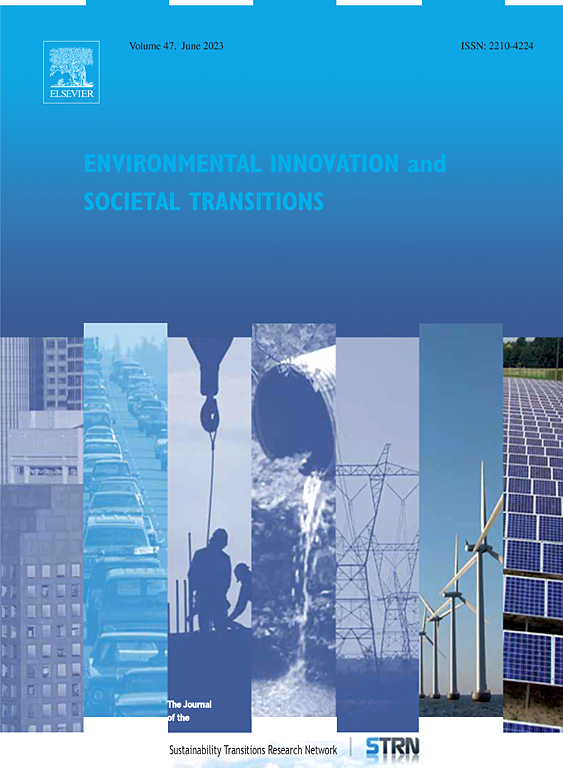Household innovation and agency in sustainability transitions
IF 5.7
2区 经济学
Q1 ENVIRONMENTAL SCIENCES
Environmental Innovation and Societal Transitions
Pub Date : 2025-03-17
DOI:10.1016/j.eist.2025.100987
引用次数: 0
Abstract
Households have so far received limited and narrow attention in the sustainability transitions literature. This is despite households being recognised routinely in sustainability policies, albeit also often from a rather narrow perspective. In this editorial to the special issue on household innovation and agency in sustainability transitions, we conceptualise households as a social unit, scale, and site that offers a fruitful avenue for research on, and the governance of, sustainability transitions. The editorial introduces 16 articles that make up this special issue and identifies 10 key contributions to transition research, policy and practice. Ultimately, the findings in this special issue recognise increased potential, willingness, possibilities and activity of diverse types of households to participate in sustainability transitions by changing social practices and relationships in the home, and shaping the social context by reaching into the realms of politics, professions, community and business. At the same time the collection recognises that there are limits to what is achievable, not the least within the constraining environment of existing socio-technical systems and politicized contexts.
可持续转型中的家庭创新和代理
到目前为止,家庭在可持续性过渡文献中受到有限和狭隘的关注。尽管家庭在可持续发展政策中经常得到认可,但也往往是从相当狭隘的角度考虑的。在这篇关于可持续转型中的家庭创新和代理的特刊社论中,我们将家庭概念化为一个社会单位、规模和场所,为可持续转型的研究和治理提供了富有成效的途径。这篇社论介绍了本期特刊的16篇文章,并确定了对转型研究、政策和实践的10项关键贡献。最终,本期特刊的调查结果认识到,通过改变家庭中的社会实践和关系,以及通过进入政治、职业、社区和商业领域塑造社会环境,各种类型的家庭参与可持续性转型的潜力、意愿、可能性和活动都有所增加。与此同时,该系列认识到可实现的目标是有限的,尤其是在现有社会技术系统和政治化背景的约束环境中。
本文章由计算机程序翻译,如有差异,请以英文原文为准。
求助全文
约1分钟内获得全文
求助全文
来源期刊

Environmental Innovation and Societal Transitions
Energy-Renewable Energy, Sustainability and the Environment
CiteScore
13.60
自引率
19.40%
发文量
90
审稿时长
56 days
期刊介绍:
Environmental Innovation and Societal Transitions serves as a platform for reporting studies on innovations and socio-economic transitions aimed at fostering an environmentally sustainable economy, thereby addressing structural resource scarcity and environmental challenges, particularly those associated with fossil energy use and climate change. The journal focuses on various forms of innovation, including technological, organizational, economic, institutional, and political, as well as economy-wide and sectoral changes in areas such as energy, transport, agriculture, and water management. It endeavors to tackle complex questions concerning social, economic, behavioral-psychological, and political barriers and opportunities, along with their intricate interactions. With a multidisciplinary approach and methodological openness, the journal welcomes contributions from a wide array of disciplines within the social, environmental, and innovation sciences.
 求助内容:
求助内容: 应助结果提醒方式:
应助结果提醒方式:


